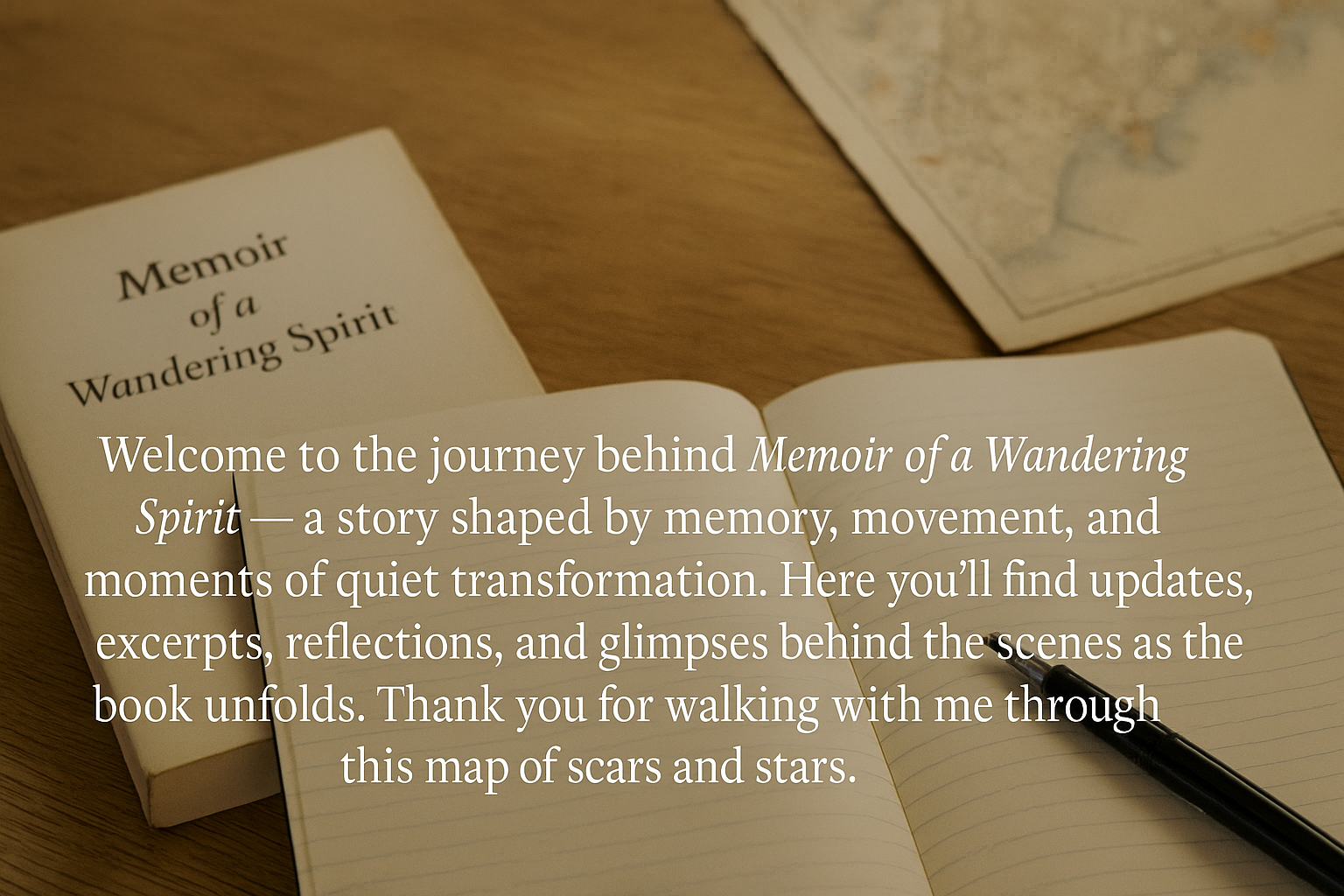✨ Two New Chapters: “Ten Golden Days” & “Where the Cows Wait”
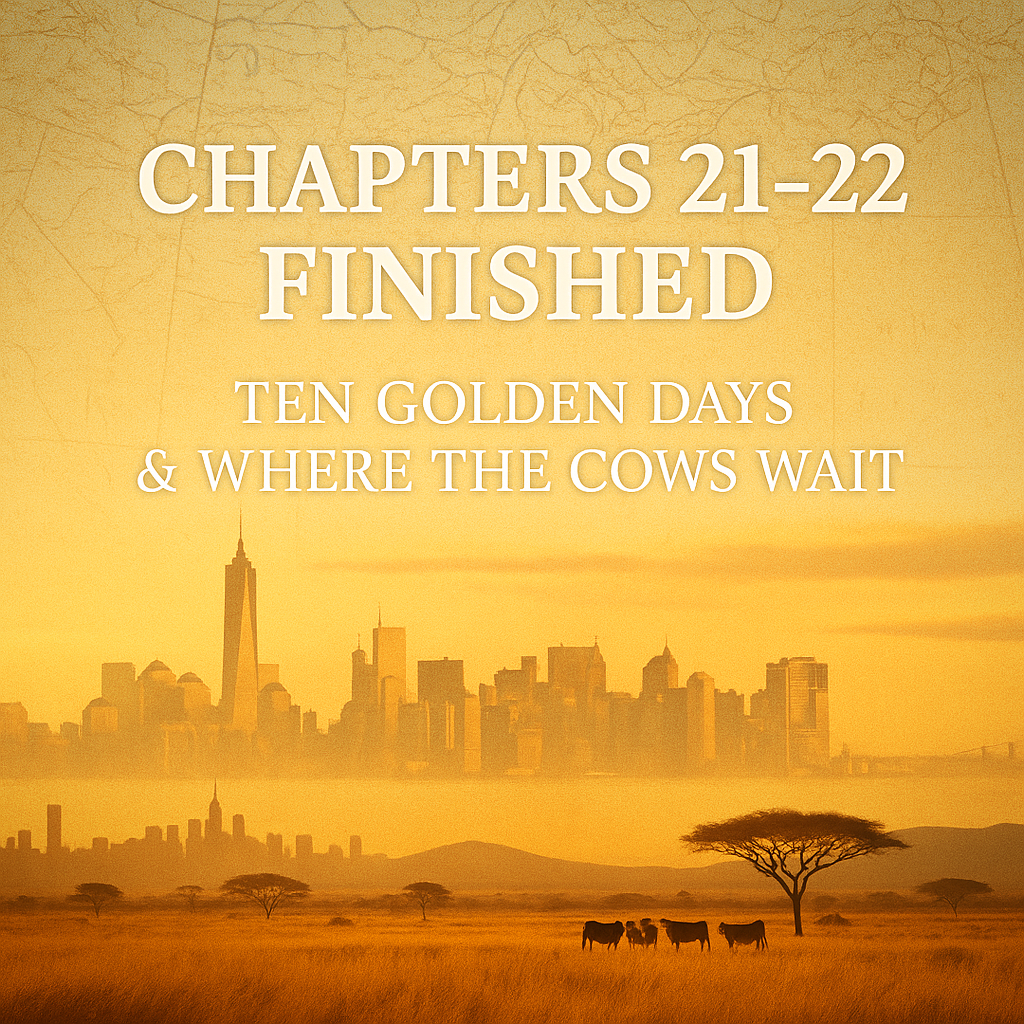
✨ Two New Chapters: “Ten Golden Days” & “Where the Cows Wait”
The journey continues. Two new chapters are complete — and with them, Kacper crosses another threshold in his long passage through war, work, and wonder.
Chapter 21 – Ten Golden Days
This chapter moves between two kinds of quiet: the strange hush of New York debrief days after Angola, and the tender stillness of a pilgrimage to Przemyśl with Mama. It sits in the tension between glass towers and cemetery pines, between lavender sheets in Lower Manhattan and the remembered mud of Bentiu — a week that lets Kacper feel both the distance from the field and the thread that still binds him to it.
In New York, he arrives bone-tired, slips into a small guest house in Lower Manhattan run by Peter and John, and discovers how comfort can sharpen memory: the softness of linens pulling Bentiu back into the room — swamp reeds, gunfire, sacks of sorghum intruding on blue walls and polished floors. The city glitters; his body refuses to forget. On Sunday, a grace note — a reunion with Magda and Ania from Nowy Sącz. They wander Times Square, drift into the hush of Central Park, tuck into a riverside walk along the Hudson; friendship steadies the day.
Then home to Nowy Sącz — and a drive east with his mother to Przemyśl, to look for Aunt Rozalia’s grave. The town greets them with San River light and old Galician façades. At the cemetery, time folds: pines, oaks, linden, birch; damp leaves underfoot; angels with broken wings; Cyrillic and Latin scripts side by side. Hours pass before they find the simple mound marked Grób Sióstr Świętej Felicyty — Sr. Rozalia. They stand a long while without speaking; grief and gratitude share the air.
A few brief excerpts
“The contrast itself seemed to be the essence of his life — Manhattan and Bentiu, lavender and swamp reeds, soft linen and dust.”
“Sunday unfolded with a brightness he had not expected… They showed him their hidden corners too — a bookshop folded between glass towers, a café with worn wooden tables, the riverside walk along the Hudson where the roar of traffic softened into the rhythm of water.”
“The cemetery gates stood tall and unhurried… It was still green — impossibly green… Catholic and Orthodox markers stood side by side — Latin and Cyrillic script entwined like old neighbours in quiet conversation.”
“Set apart from the more elaborate monuments… a simple iron cross… a small wooden plaque, lovingly carved: Grób Sióstr Świętej Felicyty — Sr. Rozalia.”
📷 Related photo albums for Chapter 21:
• Album 1 – Meeting in Sitges, Spain
• Album 2 – Visiting Przemysl, Poland
Chapter 22 – Where the Cows Wait
The flight south brings him to Nairobi, 2005. A new posting, a new continent’s rhythm. The war in Sudan has paused — but peace itself feels fragile, tentative, “a promise whispered more than shouted.” The city hums, half-hopeful, half-tired.
He meets Martin, the cautious programme manager whose kindness hides behind slow words, and Ruth, the logistician whose laughter never burns out. They will become his compass in the months to come. But first comes Lokichoggio, and then the north — the borderlands where planes land on airstrips of baked clay and the line between safety and need is drawn in dust.
“Southern Sudan was no longer at war, but neither was it yet healed. The land itself had not caught its breath.”
What follows is one of the book’s most haunting journeys — to Old Fangak, a village half-drowned by swamps and memory. Here, Kacper learns what endurance looks like without spectacle. Hunger and faith coexist, silence speaks louder than policy, and even peace smells faintly of smoke.
“He began to see what hunger meant — not statistically, but bodily, intimately. Poverty was grief, was infection, was silence after the last breath.”
And then, the discovery that gives the chapter its name: the cows. Sacred, sung, guarded by boys barely older than children. They are wealth, diary, ancestor, and song — the living heart of the Nuer world.
“Cows were not animals here. They were spirit and wealth and prayer. They were diaries and dowries, ancestors and heirs.”
Through them, Kacper grasps a truth larger than aid or ambition — that dignity and survival are not gifts to be given but languages to be learned. The final pages breathe with stillness and reverence:
“Sometimes he thought of the imbalance — of children lying hungry while cattle were led to higher ground. It felt cruel. But then, when he looked closer, it was almost holy — a covenant written in mud and milk.”
When he finally leaves, Ama folds laundry in silence — a quiet goodbye heavier than words.
“Fangak had entered like water through cracked earth — slow, steady, impossible to remove.”
Back in Nairobi, he realises he is no longer the man who arrived. Something in him has softened, widened, learned to wait.
Between Glory and Quiet
These two chapters mark a turning point. Kacper steps out of survival and into responsibility — no longer just the witness, but the one who must decide, lead, and sometimes fail. The tone of the memoir matures with him: the writing grows slower, more spacious, haunted by the awareness that every victory is partial, every lesson incomplete.
From the frozen light of Manhattan to the humid dawns of the Upper Nile, Memoir of a Wandering Spirit continues to map not only the world’s crises but also the small, stubborn sanctuaries that endure within them — friendship, faith, humility, and the grace of work done with open eyes.
“He knew this was just the beginning.”
Chapter 20: Ashes and Oceans — Complete 🌍
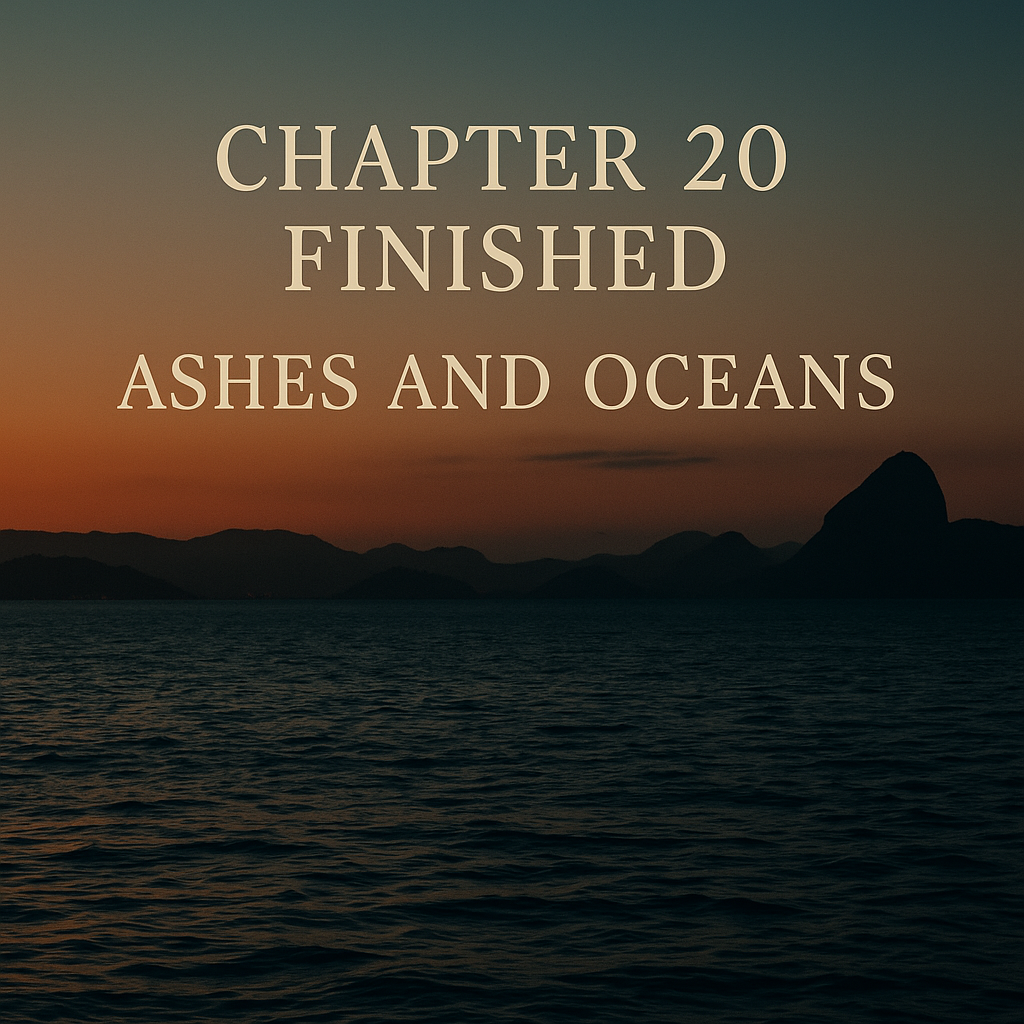
Chapter 20: Ashes and Oceans — Complete 🌍
Another chapter is complete — Ashes and Oceans — and it feels like one of the most intimate so far.
The story follows Kacper’s return to Angola, to the land that once shaped him and now welcomes him back with both warmth and unease. It is 2003: the war has ended, but its ghosts still live in craters, in memories, in the slow rebuilding of lives and hope.
He arrives in Luanda, stepping off the plane into the heavy, coastal air. The city stretches before him, still wounded and magnificent — colonial façades dissolving into tin roofs and dust. Ashes and oceans — beauty and devastation intertwined, neither yielding to the other.
This time, Kacper works with Global Nutrition International, a small humanitarian organisation determined to restore a fragile balance between need and capacity. He meets Javier and Isabel, Manuel and Elena — colleagues whose lives blur the line between duty and exhaustion. Together, they form a temporary family of sorts, united not by perfection, but by persistence.
“Angola in 2003 was a country trying to rise from decades of war, but the war had not yet loosened its grip. Its ruins were not only in shattered bridges or burned villages — they lived in the fragile bodies of its people.”
From Luanda, the road leads south, through Lubango, Matala, and Chipindo, where red dust coats the trucks and every movement feels like an act of resistance. Convoys crawl through minefields. Planes bring food, medicine, and the illusion of control. The work is relentless, and often feels insufficient.
Kacper’s vulnerability threads through the chapter quietly but persistently. He struggles with his body — heavier now than before, self-conscious, uneasy in his own skin. In group meetings and dinners by the sea, he feels both part of the mission and apart from it, burdened by the thought that perhaps he is not doing enough, not fitting the image of what he once imagined a “real humanitarian” should be.
“He did his job, filled the spreadsheets, wrote the reports, counted the rations — yet he could not escape the sense that the work was only a bandage over something vast and unhealed. He wanted to do more, to be more, but the limits of the world, and his own, pressed in like heat.”
An explosion near Chipindo changes everything. He survives, but his hearing does not — a ringing remains, constant and merciless. It becomes his companion, a reminder that service always costs something, even when invisible to others.
In Luanda, he finds a fragile source of light in Pombinha, a friend whose laughter softens the hard edges of his days. She brings warmth, humour, and an unexpected tenderness — a reminder that kindness can survive even where life feels precarious. Their bond is never named, but it anchors him.
“Pombinha had a way of seeing through him — through his pride, his fatigue, even his shame. Her presence did not erase his loneliness, but made it bearable.”
After long months of exhaustion, he finally allows himself to escape — briefly, impulsively — to Rio de Janeiro. There, in the rhythm of the city, he meets Camila, whose presence unravels him in ways he didn’t expect. Their time together is filled with light, laughter, and a longing that both heals and unsettles. Yet beneath the beauty lies guilt: a sense of betraying his own discipline, his own ideals.
“Rio was all movement — music, bodies, colour — and yet he felt strangely exposed within it, as if the city’s light had nowhere for him to hide. Camila made him laugh, but when she looked at him too long, he saw himself reflected in her gaze: a man both yearning and afraid.”
“That night, as waves broke against the dark beach, he realised that joy and regret often walk hand in hand. The world could still be tender, even when it refused to forgive.”
The story moves between the coast and the interior — between despair and resilience. There are days when the work feels futile, others when a single delivery, a repaired well, or a saved child carries the weight of redemption.
In Benguela, by the ocean, the team retreats for a few days of uneasy rest. The sea crashes endlessly, carrying both beauty and guilt — a reminder of what remains undone.
“At night the sound of the ocean drifted faintly up into Lubango’s hills, far off yet insistent, mingling in his mind with the high, merciless ringing in his ears. Ashes and oceans: beauty and ruin bound inseparably, neither yielding to the other.”
The chapter closes with quiet reflection — Kacper standing at the shoreline, aware that he has changed again. He understands now that vulnerability is not weakness, that failure is often the twin of effort, and that even imperfect work can carry meaning.
🌊 Related Photo Galleries
• 🇳🇦 Namibia — echoes of the red earth and the open horizon
• 🇦🇴 The Angolan Coast — where the Atlantic breathes against the scars of war
• 🇺🇸 The Big Apple — a reminder of the other world waiting beyond field missions
• 🇧🇷 A Visit to Rio de Janeiro — where beauty, temptation, and reflection intertwine
Ashes and Oceans is a meditation on aftermath — on what remains when the adrenaline fades, when the job is done but never finished. It is about fatigue, imperfection, friendship, and the stubborn grace that keeps us trying anyway. And it is also about the vulnerability of feeling — that brief, disarming truth that even those who give their lives to the world still crave tenderness.
Chapter 19: Between Shores — Complete
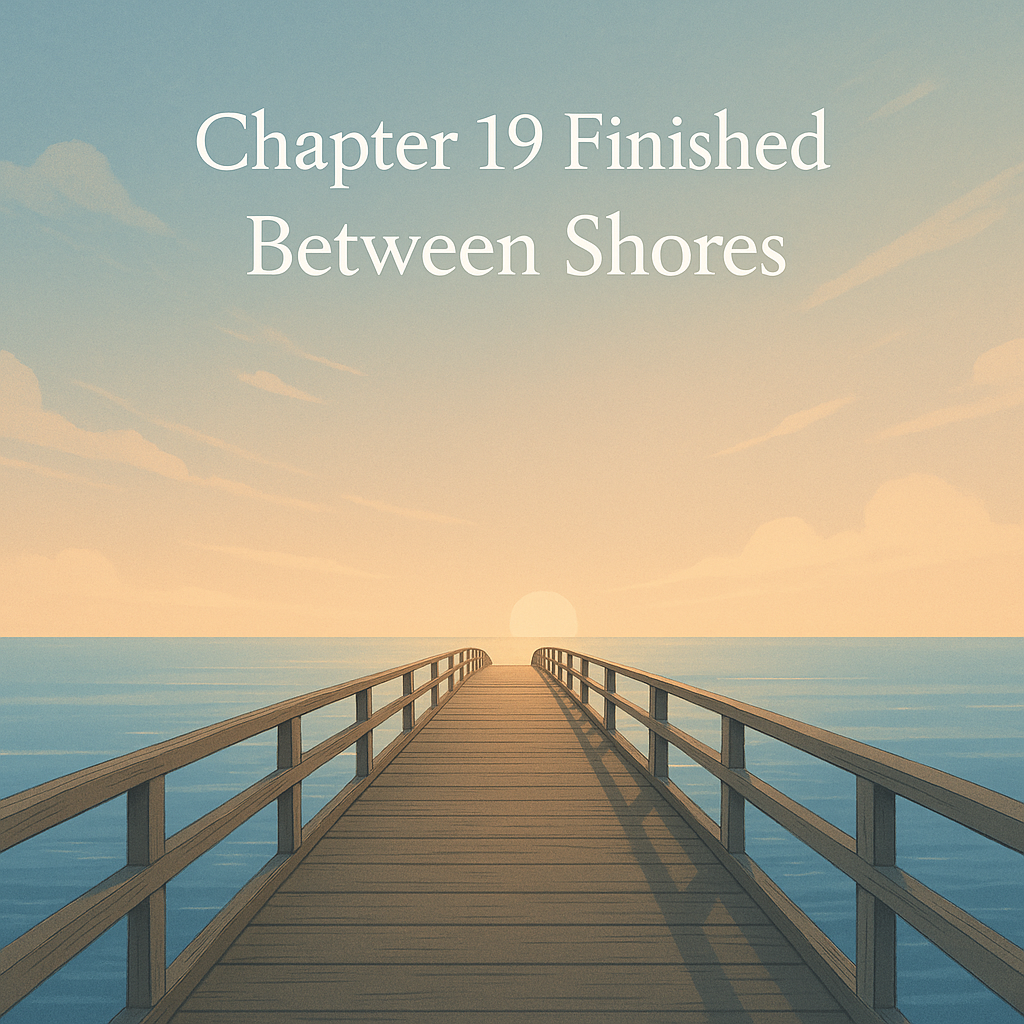
Chapter 19 is now finished, carrying Kacper into one of the most layered transitions of his journey. Titled Between Shores, it traces the crossings — physical and emotional — that mark the passage from one stage of life to another.
The chapter begins in New York City, where the dizzying scale of Manhattan seemed to dwarf him. Yet in this metropolis, a piece of home emerged: a reunion with his old friends from Nowy Sącz. Their laughter spilled into the roar of the city, proof that friendship could travel as surely as he did.
“They stood together on a New York sidewalk, the city roaring around them, and for a moment it was as if Nowy Sącz itself had crossed the Atlantic. The past and the present folded into one another, a reminder that no distance could erase the bonds of origin.”
The journey then shifts to Prague, where Kacper travelled with his mother. Walking over Charles Bridge, pausing in quiet squares, they found a closeness that had often been obscured by distance and circumstance. For Kacper, Prague became not only a lesson in history, but a lesson in presence.
“Prague unfolded not just as a city of spires and bridges, but as a lesson in how beauty and burden can exist side by side. With his mother at his side, Kacper felt that whisper more deeply than ever.”
From there, the narrative settles in Paris, where the city itself became a passage. By day, he learned the ropes of humanitarian work — logistics, finance, the architecture of missions. By night, he wandered the banks of the Seine, falling in love with the rhythm of a place that seemed to breathe both past and future. Paris was where vocation and longing converged.
Finally, the chapter carries him to Île de Ré, where bicycles, harbours, and the Atlantic winds taught another kind of lesson: that learning is not only about ambition or duty, but also about noticing, slowing down, and being reshaped by the ordinary.
📷 Photo Album – Île de Ré
“The island revealed itself in colours more honest than any textbook: whitewashed houses with green shutters, geraniums spilling over stone sills, salt in the air. Kacper realised that learning could be a slow act of noticing.”
Between Shores is not only about moving between countries. It is about being suspended between identities — son and professional, learner and humanitarian, dreamer and doer. Each crossing leaves a trace. Each shore leads to another.
Chapter 18 Finished — When the Rains Came, and the Guns Fell Silent
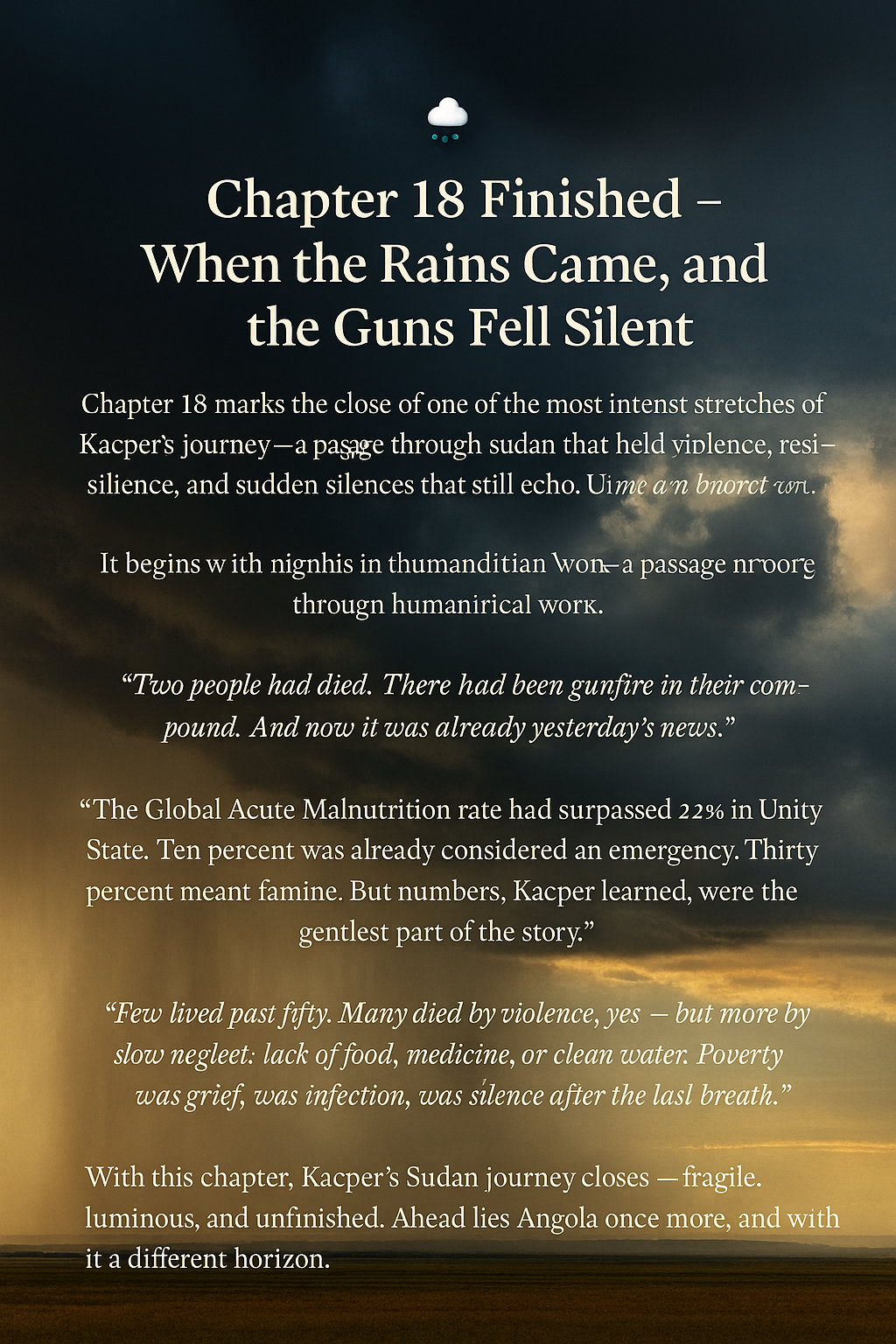
Chapter 18 marks the close of one of the most intense stretches of Kacper’s journey — a passage through Sudan that held violence, resilience, absurdity, and sudden silences that still echo.
It begins with nights in Rubkona and Bentiu, where gunfire tore through the darkness, only to be dismissed the next morning as “just two families fighting over cows.” In these contradictions — laughter beside loss, neighbourly protection alongside casual killing — Kacper discovered what it meant to live between terror and absurdity.
The chapter takes us deeper into the realities of humanitarian work: the conscription of two young Nuer nurses, Thiech and Gatluak, who vanished into warlord Paulino Matip’s militia overnight; the Therapeutic Feeding Centres in Wau and Unity State, where malnutrition rates reached famine levels; and the crushing weight of numbers that were never just statistics, but children’s bodies, parents’ impossible choices, and grief that became routine.
And yet, the rains did come. And, at least for a time, the guns did fall silent. Kacper’s time in Sudan closes with moments of surreal humanity — neighbours offering reassurances after bloodshed, colleagues sharing whispered jokes under mosquito nets, and his own return to Khartoum before reassignment to Angola.
Here are a few short excerpts to bring you closer to the texture of Chapter 18:
“The streets were nothing more than ruts of red dust, sometimes interrupted by puddles that reflected the sky like broken mirrors. Goats wandered freely, sometimes pausing to scratch against leaning wooden poles. Children ran barefoot, chasing tyres with sticks, laughing as if war had never passed this way. Women sat outside their tukuls weaving mats, grinding grain, or stirring pots balanced on three stones and fed with dry branches. The market buzzed quietly — stalls of sorghum, dried fish, worn-out clothes laid on tarps. Some women balanced impossible loads on their heads: plastic jerrycans, bundles of firewood, stacks of vegetables. Nuer-style homesteads stood in clusters — circular, low, with neat fences made of twisted branches. Smoke drifted lazily in the late light, from cooking fires or perhaps burning grass. It smelled of wood, ash, and something faintly sweet — a scent Kacper would come to associate with this place.”
“The Global Acute Malnutrition rate had surpassed 22% in Unity State. Ten percent was already considered an emergency. Thirty percent meant famine. But numbers, Kacper learned, were the gentlest part of the story.”
“Few lived past fifty. Many died by violence, yes — but more by slow neglect: lack of food, medicine, or clean water. Poverty was grief, was infection, was silence after the last breath.”
"That night, after the woman and her child had been admitted, Kacper and Lucy sat outside the compound, each with a mug of sweet karkadé in hand. The generator had been shut off early, so the silence was fuller than usual — punctuated only by the faint trill of night insects and the distant barking of dogs near the barracks.
Above them, the stars came in layers, thick and low, as if you could climb them if you dared.
Neither spoke for a long while.
Then Lucy broke the silence.
“Do you ever feel like we’re part of it?”
Kacper turned to her, not quite understanding.
“Part of what?”
“The theatre,” she said. “The coordination meetings. The clinics that aren’t clinics. The statements about humanitarian neutrality while everything burns around us.”
Kacper didn’t answer. He sipped the karkadé. Let it cool in his mouth.
Lucy continued, more softly now.
“I mean, we do what we can. But it’s like trying to keep the roof on a house that’s already on fire.”
He looked at her, this friend with whom he had shared so many battles, floods, impossible days. Her face was drawn, streaked with dust. Her blouse still carried the mark of the child she’d carried earlier — a faint outline of sweat and weakness. But her eyes were clear.
“We didn’t start the fire,” he said.
She smiled faintly.
“No. But we live in the smoke.”
They sat like that for a while — two foreign souls under a borrowed sky, neither defeated nor triumphant. Just tired. And still there."
With this chapter, Kacper’s Sudan journey closes — fragile, luminous, and unfinished. Ahead lies Angola once more, and with it a different horizon.
Chapter Updates: Between Borders & The Body’s Secret
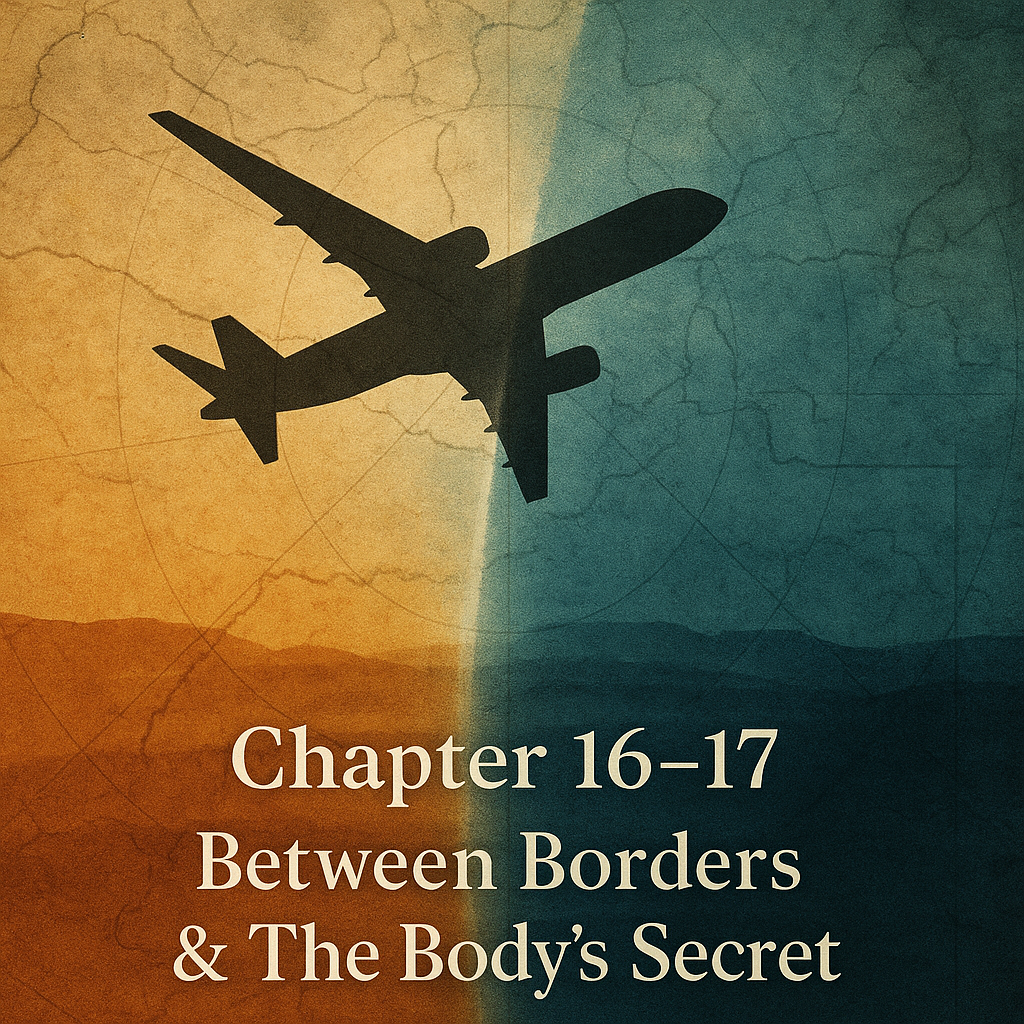
Chapter 16: Between Borders
From the rooftop silence of Wau, where survival was written in dust and endurance, Kacper’s life kept stretching outward. The war had turned Wau into an island, but his work required crossings — north to Khartoum, east to fragile corners of Sudan, south to Nairobi, and sometimes further still, back to Paris or even Dublin. Each journey felt like slipping through a membrane: from Antonovs rattling over frontlines to the polished calm of Parisian cafés, from the immediacy of war to the cities that only brushed it through reports and statistics.
“Flying itself carried that same mixture of threshold and uncertainty. Once, on a journey to Khartoum aboard a Sudan Airways Antonov, Kacper found himself part of a scene that seemed almost too absurd to be real. The pilots were Russian, the rest of the crew Sudanese. Before take-off the plane sank into a patch of mud at the edge of the tarmac, and the solution was announced without hesitation: the passengers would push. Under the hot sun they leaned their shoulders into the steel belly of the aircraft, straining until the wheels rolled onto firmer ground. By then the engines had overheated, and one of the pilots, utterly unfazed, cooled them by pouring buckets of water over the metal as though dousing an animal after work. Kacper felt dread rising like a tide — his chest tight, his legs light with the urge to faint. Yet the crew’s calm, their matter-of-factness, made the surreal seem routine. If we die, he thought, it will at least be a highly unusual death. The thought itself, absurd and strangely comforting, carried him back on board.”
Flying became a theatre of the surreal. On one flight to Khartoum, passengers were asked to push the plane out of a patch of mud before overheated engines were cooled with buckets of water. Every border crossed was not just geographic but existential — between safety and danger, belonging and estrangement.
Chapter 17: The Body’s Secret
The battles outside soon gave way to one within. A sudden illness sent Kacper from Khartoum’s clinics into a whirlwind of uncertainty. The doctors whispered a word heavier than any he had carried before: cancer. The diagnosis was uncertain, yet its echo hollowed him out. Evacuation orders followed swiftly — first Paris, then Nairobi.
“The word cancer had not yet been confirmed, but it lingered in every silence, in every doctor’s lowered glance. It was not the war outside anymore. It was the possibility of a war inside.”
What had once been the rhythm of war became the rhythm of waiting rooms, procedures, and fragile reassurances. He lay under anaesthesia in Khartoum, endured colonoscopies in Nairobi, and later found himself at the Pasteur Institute in Paris, all within weeks. Four scopes, a surgery, and the gnawing thought that the fight might now be inside his own body.
“That evening, at Rue Niepce, the GNI team organised a small party. It felt good to be among familiar faces, who celebrated his recovery as warmly as he did. Kacper retold the story in all its strange twists: the Khartoum surgeon cutting into him for “haemorrhoids”, the colonoscopy that followed, the chaos of the flight to Kenya, the sudden death of his doctor, two more in Nairobi, the absurdity of a first-class ticket to Europe, and finally another at the Pasteur Institute — four colonoscopies and a surgery in a single month. The sheer improbability of it drew laughter, not mocking but grateful, a shared release — a celebration of life, survival, and the strange roads they take.”
Yet amid the fear there were moments of light — the relief of hearing that it was not cancer but a chronic condition to be managed, the bittersweet awareness of life’s precarious edge. Between borders of land and sky, of illness and health, Kacper found himself waiting, suspended between endings and beginnings.

